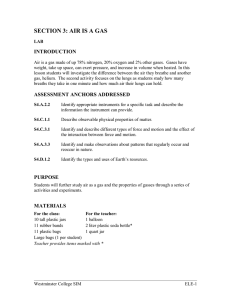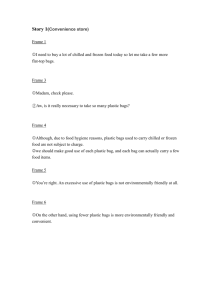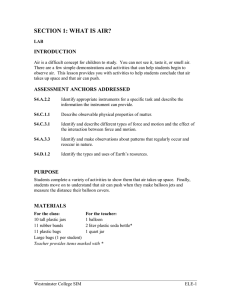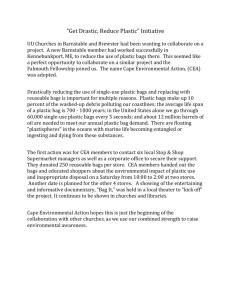All for naught? The plastic bag debate as a window... abandonment of zero waste policy in New Zealand
advertisement
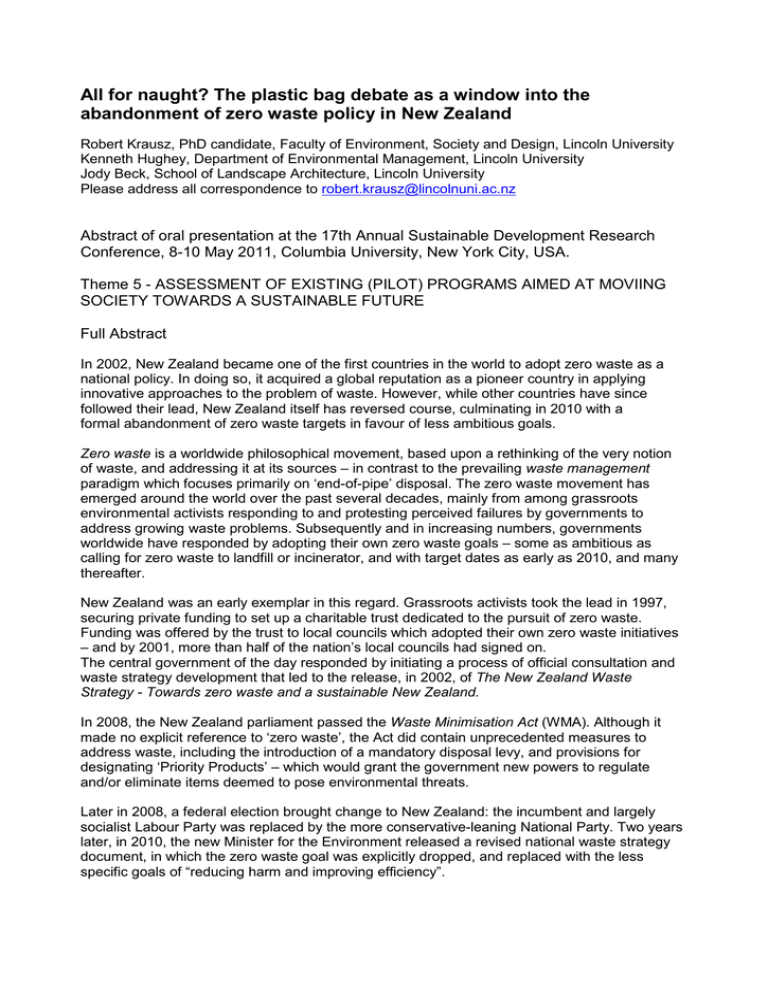
All for naught? The plastic bag debate as a window into the abandonment of zero waste policy in New Zealand Robert Krausz, PhD candidate, Faculty of Environment, Society and Design, Lincoln University Kenneth Hughey, Department of Environmental Management, Lincoln University Jody Beck, School of Landscape Architecture, Lincoln University Please address all correspondence to robert.krausz@lincolnuni.ac.nz Abstract of oral presentation at the 17th Annual Sustainable Development Research Conference, 8-10 May 2011, Columbia University, New York City, USA. Theme 5 - ASSESSMENT OF EXISTING (PILOT) PROGRAMS AIMED AT MOVIING SOCIETY TOWARDS A SUSTAINABLE FUTURE Full Abstract In 2002, New Zealand became one of the first countries in the world to adopt zero waste as a national policy. In doing so, it acquired a global reputation as a pioneer country in applying innovative approaches to the problem of waste. However, while other countries have since followed their lead, New Zealand itself has reversed course, culminating in 2010 with a formal abandonment of zero waste targets in favour of less ambitious goals. Zero waste is a worldwide philosophical movement, based upon a rethinking of the very notion of waste, and addressing it at its sources – in contrast to the prevailing waste management paradigm which focuses primarily on ‘end-of-pipe’ disposal. The zero waste movement has emerged around the world over the past several decades, mainly from among grassroots environmental activists responding to and protesting perceived failures by governments to address growing waste problems. Subsequently and in increasing numbers, governments worldwide have responded by adopting their own zero waste goals – some as ambitious as calling for zero waste to landfill or incinerator, and with target dates as early as 2010, and many thereafter. New Zealand was an early exemplar in this regard. Grassroots activists took the lead in 1997, securing private funding to set up a charitable trust dedicated to the pursuit of zero waste. Funding was offered by the trust to local councils which adopted their own zero waste initiatives – and by 2001, more than half of the nation’s local councils had signed on. The central government of the day responded by initiating a process of official consultation and waste strategy development that led to the release, in 2002, of The New Zealand Waste Strategy - Towards zero waste and a sustainable New Zealand. In 2008, the New Zealand parliament passed the Waste Minimisation Act (WMA). Although it made no explicit reference to ‘zero waste’, the Act did contain unprecedented measures to address waste, including the introduction of a mandatory disposal levy, and provisions for designating ‘Priority Products’ – which would grant the government new powers to regulate and/or eliminate items deemed to pose environmental threats. Later in 2008, a federal election brought change to New Zealand: the incumbent and largely socialist Labour Party was replaced by the more conservative-leaning National Party. Two years later, in 2010, the new Minister for the Environment released a revised national waste strategy document, in which the zero waste goal was explicitly dropped, and replaced with the less specific goals of “reducing harm and improving efficiency”. The set of events which led to the abandonment of zero waste in New Zealand is complex, and identifying all of the contributing factors and their sources is a highly challenging task. Rather than attempt to pick apart each component of the overall waste stream, this study focuses on one particular subset of it – plastic shopping bags – and employs it as a ‘window’ into the wider issue of the demise of the zero waste movement. The ubiquitous plastic bag has become a universal symbol of the modern throwaway society. Viewed widely as lowhanging fruit on the waste tree, it has become a popular target for reduction or elimination - and in many cases around the world, a chosen starting point for larger zero waste efforts. The resulting debate on plastic bags has become one of the most high-profile topics of environmental discourse today, and a useful indicator of attitudes toward, and performance on, wider sustainability issues. In New Zealand, pressure to ban or charge for plastic bags emerged from the grassroots shortly after the 2002 declaration of the national zero waste policy. At the time, there were already a small number of retail stores across the country which chose on their own to charge for giving out these bags at the checkout. The packaging industry responded pre-emptively to the increased prospect of government legislation, with the passing in 2004 of a voluntary accord that emphasized recycling in favour of reduction or reuse. This gesture from industry appears to have succeeded in averting any legislation to regulate plastic bag use, until the passage in 2008 of the WMA. Of particular interest to zero waste advocates – and concern to industry – was the ‘Priority Products’ clause, which gave the government the power to regulate, or ban outright, items such as plastic bags which were deemed to be harmful to the environment. The change in government which shortly followed, however, appears to have given the plastic bag another reprieve. Continued grassroots pressure on the issue led the new Minister for the Environment to announce publicly, in 2009, plans to introduce a plastic bag tax. This proposal, however, was opposed by the Prime Minister, who indicated that voluntary, industry-led measures were preferred to mandatory ones. No further action on plastic bags has emerged from the New Zealand government since then. Later that same year an initiative to charge a fee for plastic bags was launched, by one of the country’s two main supermarket chains. The move resulted in immediate and significant reductions in bag consumption; however, industry opposition, a negative response from some shoppers, and fears that business would be lost to the rival chain – which did not follow suit – contributed to the fee being abandoned within a month of its introduction. Analysis of the plastic bag debate in New Zealand provides a valuable window into the evolution of its national zero waste policy, from adoption to abandonment. The results reveal the following key factors which can be attributed to the policy’s failure in New Zealand: (1) An absence of clear articulation between specific elements of the waste stream, and how addressing them will achieve the zero waste goals. In the case of plastic bags, there is no clear indication, in the waste strategy, of how reducing or eliminating them would address any of the targets. It is therefore not clear, to either the public or government, what are the consequences of failing to address plastic bags – or any other component of the waste stream. (2) A change of government from one which enacted the zero waste legislation, to one which largely rejected its key tenets. The 2002 waste strategy has simply failed to survive the shift to a new government with sharply different priorities than its predecessor. The WMA can not be as easily rejected, because it is enacted legislation – but it can be ‘ignored’, as demonstrated by the fact that the ‘Priority Products’ clause has yet to be invoked. The formal abandonment of zero waste in the 2010 revised waste strategy makes the new government’s opposition to this philosophy quite clear. (3) The absence of a ‘champion’ within the higher ranks of government, to advance the cause of zero waste in the face of intense industry resistance, public apathy, and conflicting political agendas. During the Labour government of 1999-2008, zero waste was championed in parliament mainly Green Party members outside of Cabinet. It appears likely that more progress towards zero waste goals would have resulted, if these minority party proponents had instead been within the governing party. The new National government, with a significantly different overall philosophy which favours unfettered markets to legislated government intervention, offers an even lesser likelihood for the emergence of a zero waste champion(s) among the inner ranks of government. This was demonstrated when the new Minister for the Environment failed to advance the idea of a plastic bag tax – and further evidence is the lack of any other zero waste-related initiatives on the government agenda since then. (4) A lack of widespread and well-organized grassroots support for implementing the zero waste policy. While grassroots groups have led the push for zero waste in New Zealand, they have never amounted to more than isolated pockets of advocacy in a larger sea of public apathy. The zero waste movement has been vocal at times – such as in 2009 when pressure on the government to act elicited a signal from the Minister for the Environment to consider a bag tax. However, there has been a general lack of followthrough, with public pressure virtually non-existent since the tax idea was vetoed, and since the fee in supermarkets was launched and then abandoned shortly thereafter. Meanwhile, wider public apathy has endured and even grown at times to antipathy, notably in the case of consumers who resisted against the short-lived supermarket plastic bag fee. It appears that a resurrection of zero waste in New Zealand may require a seismic shift in public attitudes, regardless of what is done at the government level.

